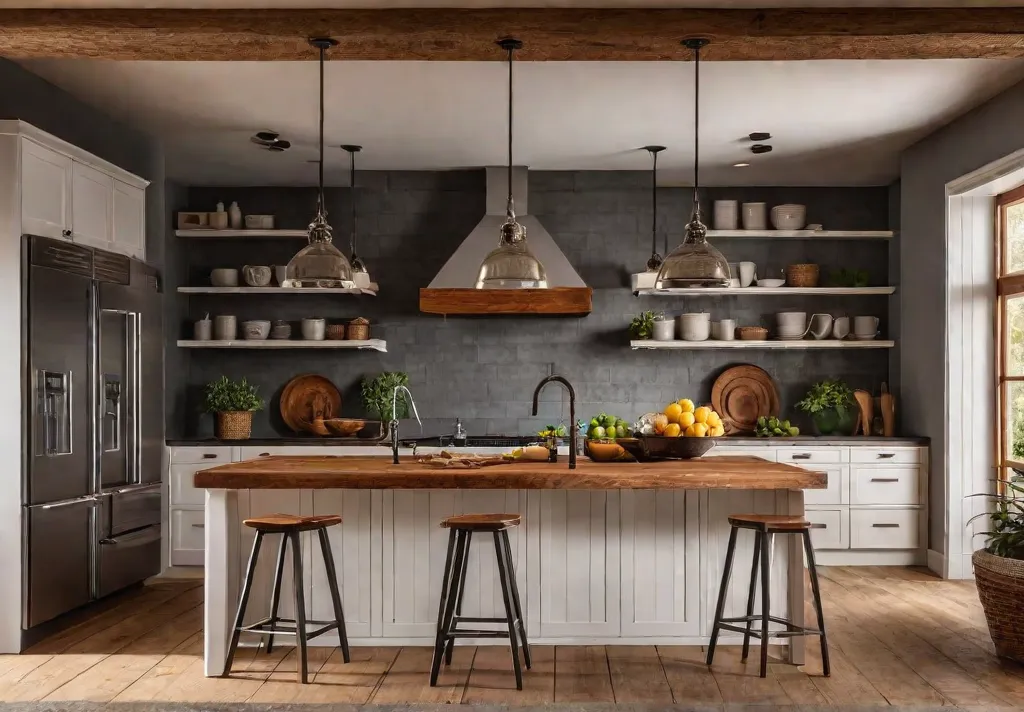Are you dreaming of a cozy, rustic farmhouse kitchen but unsure where to start? You’re not alone! Farmhouse-style kitchens have become a top choice for homeowners looking to create a warm, inviting space. And the key to achieving that charming, lived-in look? It all starts with the cabinets.
As a country gentleman passionate about natural living, I know firsthand the appeal of farmhouse design. I grew up on a rural estate in Connecticut, surrounded by the rugged beauty of the outdoors. That upbringing has deeply influenced my aesthetic, which celebrates life’s simple pleasures in the countryside.
In this comprehensive guide, I’ll walk you through the step-by-step installation of farmhouse-inspired kitchen cabinets. Whether you’re embarking on a full-scale renovation or just looking to update your existing cabinets, you’ll discover how to achieve professional results without breaking the bank.
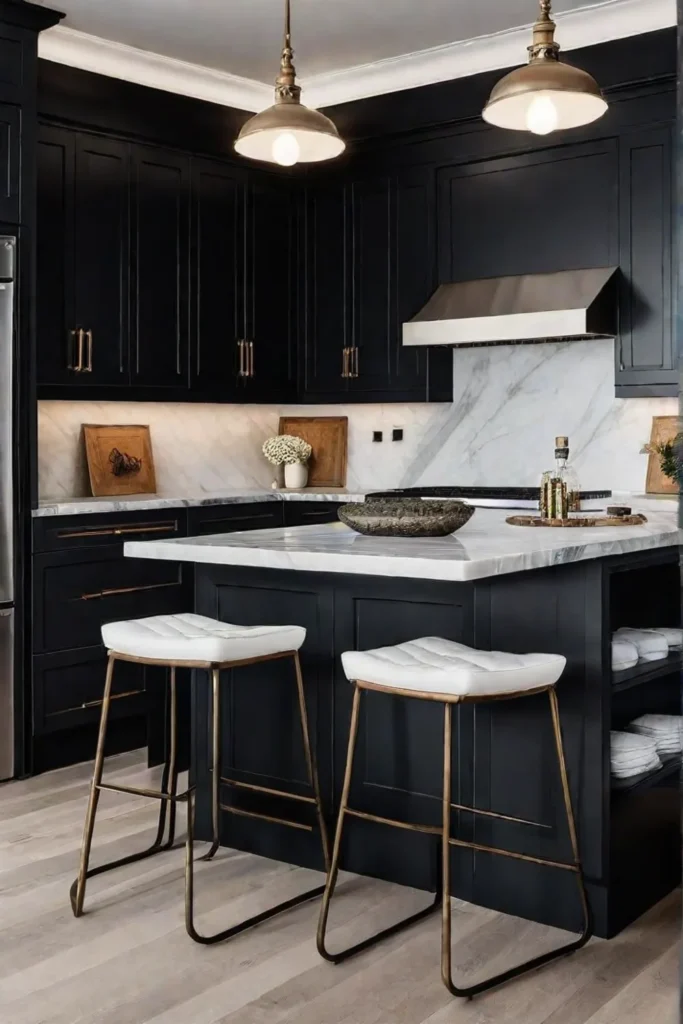
We’ll cover everything from assessing your kitchen layout, selecting the perfect cabinets, preparing the space, and tackling the installation. And if you run into any unexpected challenges, don’t worry – I’ve got you covered with my best troubleshooting tips.
By the end of this guide, you’ll have the confidence and know-how to transform your kitchen into a cozy, charming farmhouse haven. So, grab your tools, and let’s get started on your DIY journey!
Assessing Your Kitchen Layout
Evaluating your current kitchen layout is essential before starting the cabinet installation process. After all, a well-planned layout is the foundation for a successful farmhouse kitchen makeover.
Start by examining your existing space. Consider countertop height, storage needs, traffic flow, and room size. Carefully measure the available space where you plan to install the cabinets, making sure to account for any obstructions like windows or doors.
Farmhouse kitchens often feature an open, airy layout that promotes functionality and visual appeal. When planning your cabinet placement, consider incorporating peninsula or island configurations to maximize counter space and create a natural gathering spot.
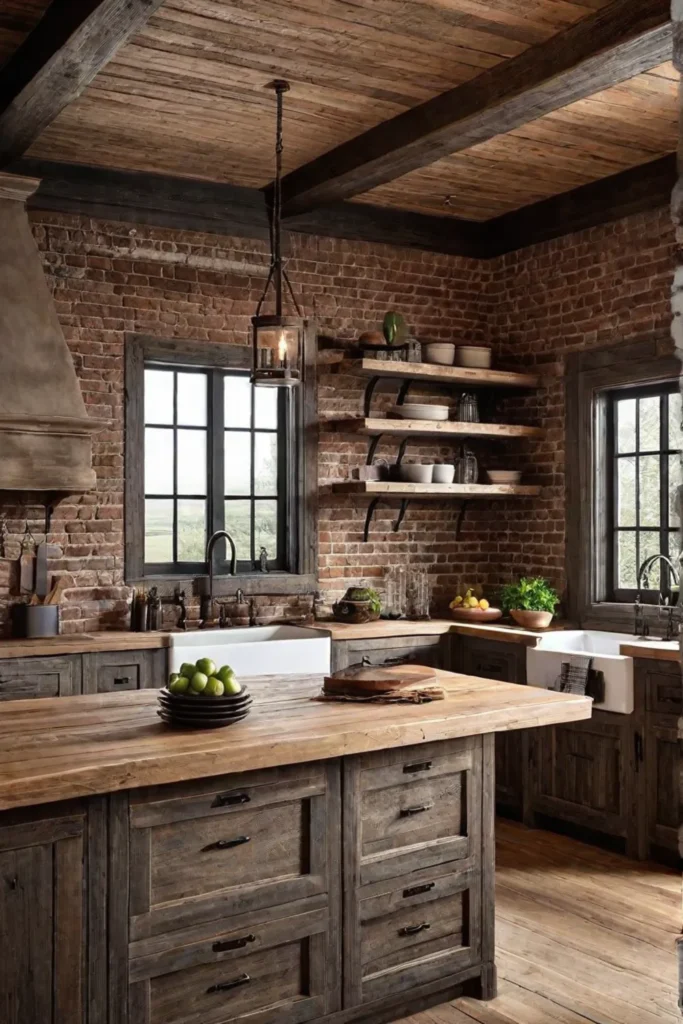
As you assess your kitchen, also note any structural constraints, such as load-bearing walls or columns, that could impact your cabinet placement. Don’t forget to consider your home’s architectural style—it can influence the type of cabinets that will work best.
By thoroughly evaluating your kitchen layout, you’ll lay the groundwork for a seamless farmhouse cabinet installation process. Careful planning now will save you time and frustration down the road.
Selecting the Right Farmhouse Cabinets
Now that you’ve solidly understood your kitchen’s layout, it’s time to choose the perfect farmhouse-style cabinets. This is where the fun really begins!
Farmhouse cabinets are all about embracing natural materials and rustic charm. Look for options in warm, earthy tones like oak, maple, pine, or cherry. MDF or particle board can also work well if your budget is a bit tighter.
When it comes to the finish, farmhouse-style cabinets often feature a distressed or weathered look, adding to their charming, lived-in appeal. White-washed, shaker, and beadboard styles are popular choices that give your kitchen a cozy, country feel.
Don’t forget about the hardware! Vintage-inspired knobs pulls, and hinges are the perfect finishing touches to complete your farmhouse aesthetic. These small details can make a big impact, so choose wisely.
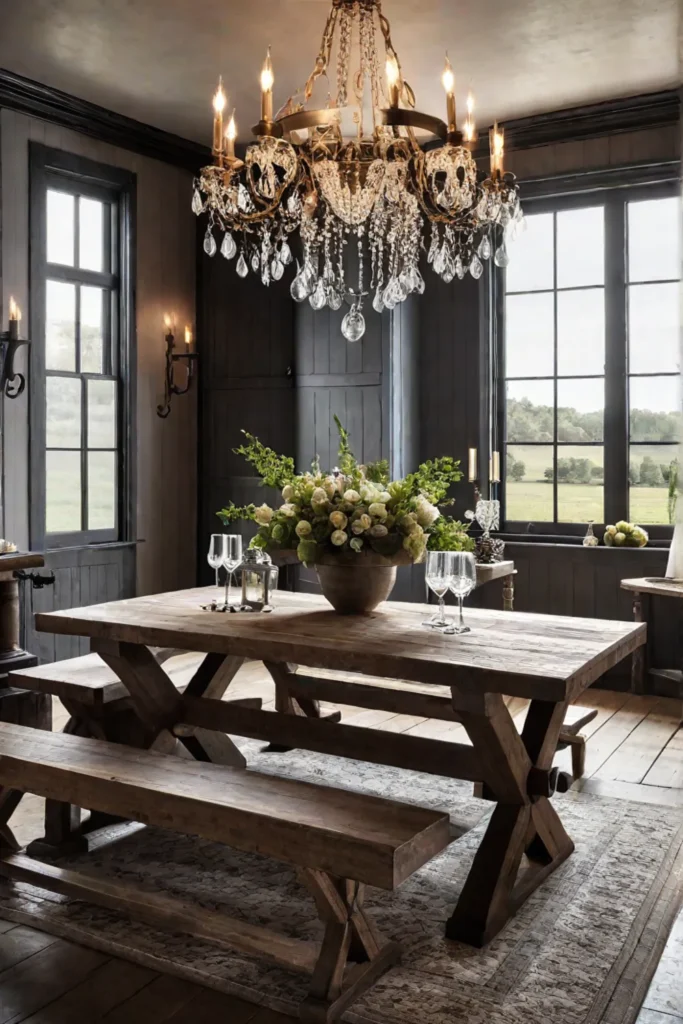
As you select your cabinets, consider how they’ll integrate with the rest of your kitchen design. Consider wall color, lighting, flooring, countertops, and backsplashes to ensure a cohesive, visually stunning look.
By carefully choosing the right farmhouse cabinets, you’ll be well on your way to creating a timeless and personal kitchen. It’s all about blending function and style to craft a space that reflects your unique country-chic sensibilities.
Preparing the Kitchen for Cabinet Installation
Alright, now that you’ve picked out the perfect farmhouse cabinets, it’s time to prepare your kitchen for the installation process. Proper preparation is key to ensuring a smooth, efficient project.
Let’s start by clearing the space. Remove all items from the countertops and shelves and store them safely out of the way. Take down any wall decorations or artwork that might interfere with the cabinet installation. Be sure to clear the floor of any furniture or appliances that can’t be easily moved.
Next, it’s time to disconnect those kitchen appliances. Turn off the power supply, unplug everything, and remove any built-in appliances like ovens or cooktops. Cover the openings with protective material to keep dust and debris at bay.
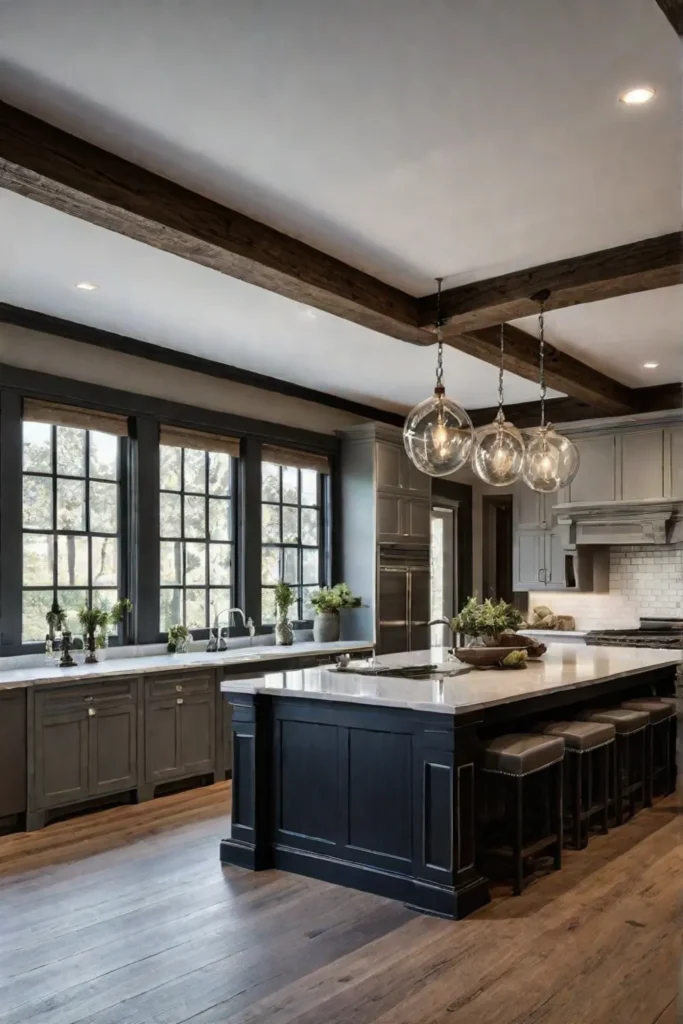
Finally, let’s get those walls and floors ready. Inspect the walls for cracks, holes, or uneven surfaces and fill them in with appropriate fillers. Sweep or vacuum the floors thoroughly and mop them if needed. Lay down drop cloths or plastic sheeting to safeguard your floors during the installation.
By properly preparing your kitchen, you’ll set the stage for a successful farmhouse cabinet installation. No one likes unexpected roadblocks, so let’s ensure we’ve covered all our bases before diving in.
Installing the Base Cabinets
The hard work is done – it’s time to start installing those farmhouse-inspired cabinets! Let’s begin with the base units, which form the foundation of your kitchen design.
Start by measuring the space where your cabinets will go and marking the placement of each one. Use a square or level to ensure your measurements are spot-on. Then, it’s time to secure those cabinets to the wall.
Attach the base units using screws and anchors, making sure they’re level and plumb as you go. A good level is your best friend here – you’ll want to check the cabinets from side to side and front to back to ensure everything is perfectly aligned.
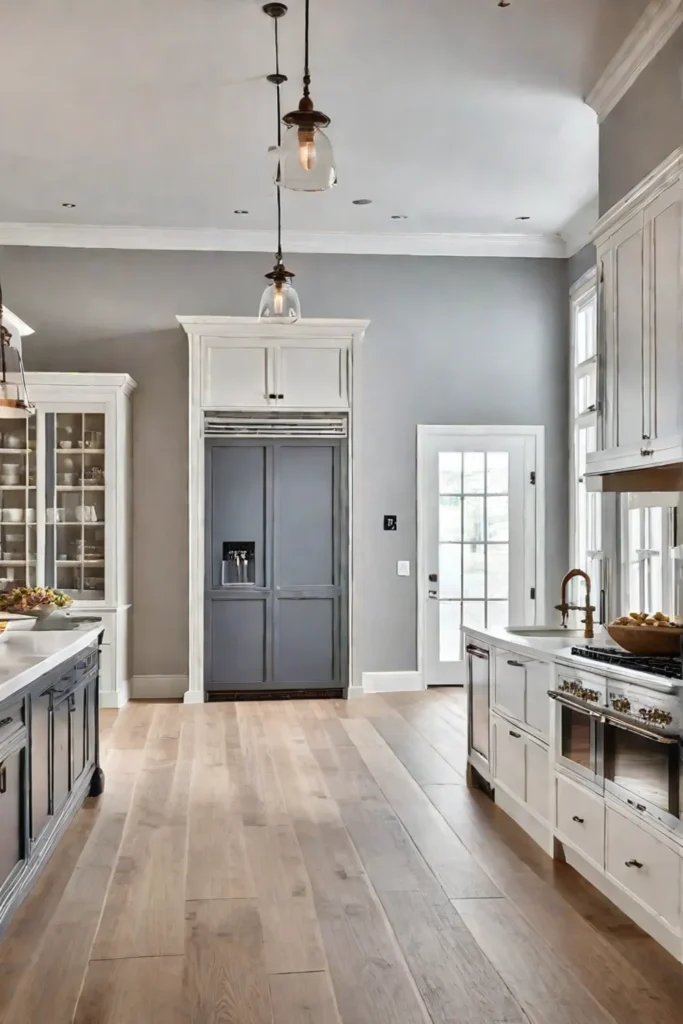
If you encounter any uneven walls or floors, don’t worry. You can use shims to fill the gaps and level things out. Just take your time and double-check your work. After all, those base cabinets are the backbone of your farmhouse kitchen, so you want to get them right.
By following these steps and focusing on precision, you’ll have a solid, stable foundation that sets the stage for the rest of your cabinet installation. And let me tell you, there’s nothing quite like the satisfaction of seeing those first base units go up without a hitch!
Hanging the Upper Cabinets
With the base cabinets securely in place, it’s time to tackle the upper units. These cabinets play a crucial role in your farmhouse kitchen’s overall look and functionality, so let’s ensure we get them installed just right.
Start by measuring and marking the placement of each upper cabinet. Use the center points you marked earlier to ensure perfect alignment with the base units below. This attention to detail will make your kitchen shine.
Next, it’s time to get those cabinets up on the wall. Secure them to the wall studs using screws, making sure they’re level and plumb as you go. Use shims to fill gaps and ensure a seamless fit if needed.
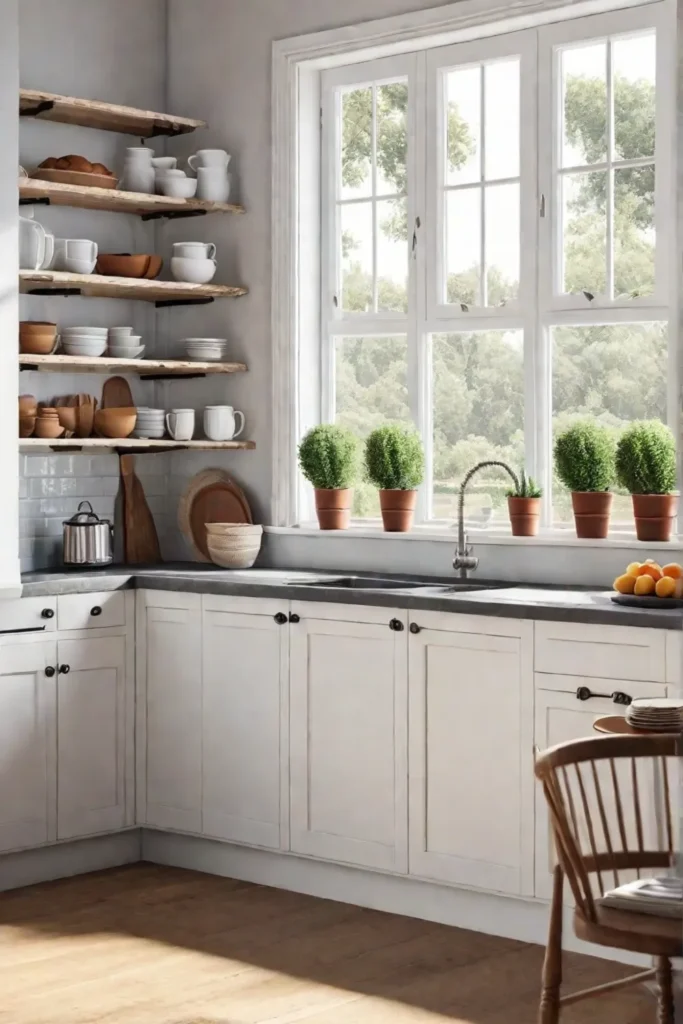
One thing to remember with farmhouse-style kitchens is the incorporation of open shelving or glass-front cabinets in the upper configuration. These design elements add an airy, inviting feel that is essential to the farmhouse aesthetic. As you install your upper cabinets, consider incorporating these features to make your kitchen stand out.
By properly measuring, marking, and securely installing your upper cabinets, you’ll be well on your way to a cohesive, visually stunning farmhouse kitchen. It’s all about paying attention to the little details to achieve that perfect, lived-in look.
Finishing Touches and Accessories
All right, the hard work is done. Your farmhouse kitchen cabinets have been installed and are looking fantastic! But we’re not quite finished yet. It’s time to add those all-important finishing touches and accessories to bring your space to life.
First up, let’s talk hardware. Farmhouse kitchens love to showcase vintage-inspired knobs, pulls, and hinges. These small details can make a big impact, so choose wisely. Look for options with a rustic, aged finish that complements the overall aesthetic of your cabinets.
Next, add some decorative moldings or trim to amp up the farmhouse charm. Crown molding, wainscoting, and chair rails are all great options that add character and definition to your kitchen.
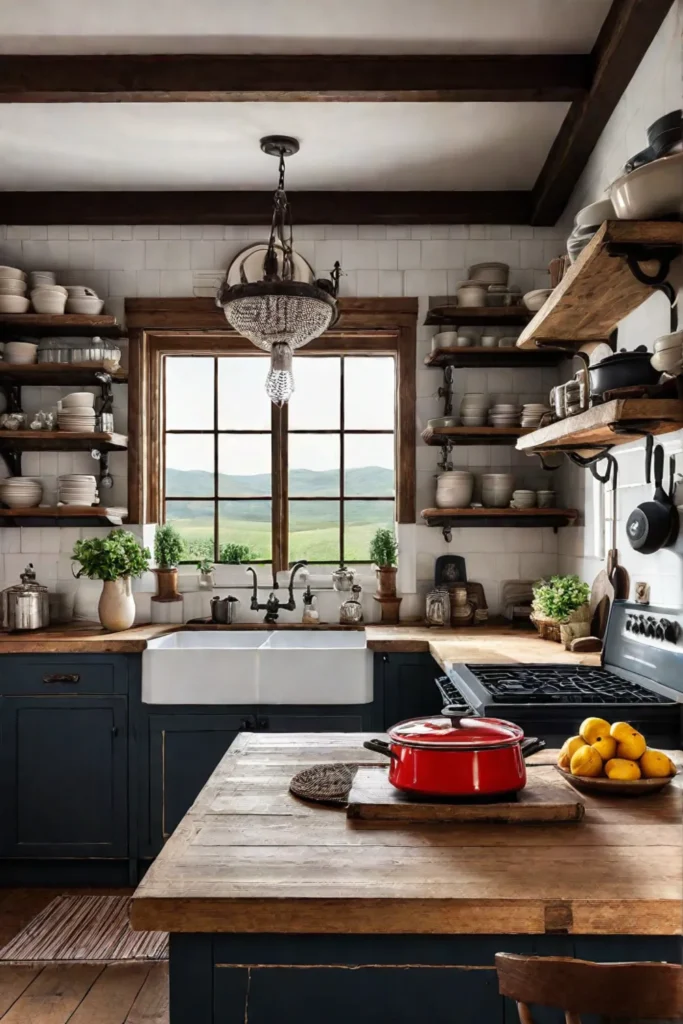
And don’t forget about the walls! Shiplap paneling or beadboard backsplashes are quintessential farmhouse elements that instantly elevate your space. These textural touches create a warm, inviting atmosphere that’s hard to beat.
Finally, accessorize with some farmhouse-inspired decor. Hang personalized signs or artwork featuring rustic typography. Incorporate natural elements like wood, metal, or vintage-inspired accents. These little touches will help your kitchen feel like a cozy, lived-in haven.
Focusing on the finishing details will transform your newly installed farmhouse cabinets into a truly authentic, charming kitchen environment. It’s all about blending function and style to create a space that feels like it’s been there for years.
Maintaining and Caring for Farmhouse Cabinets
Congratulations, your farmhouse kitchen transformation is complete! But the work doesn’t stop there. Proper maintenance and care are essential to ensure your beautiful new cabinets continue to shine for years to come.
First and foremost, keep those cabinets clean. Use specialized cleaning products designed for distressed or weathered finishes, and avoid harsh chemicals that could damage the wood or paint. Wipe down the surfaces regularly to prevent dirt buildup and preserve the unique character of your farmhouse cabinets.
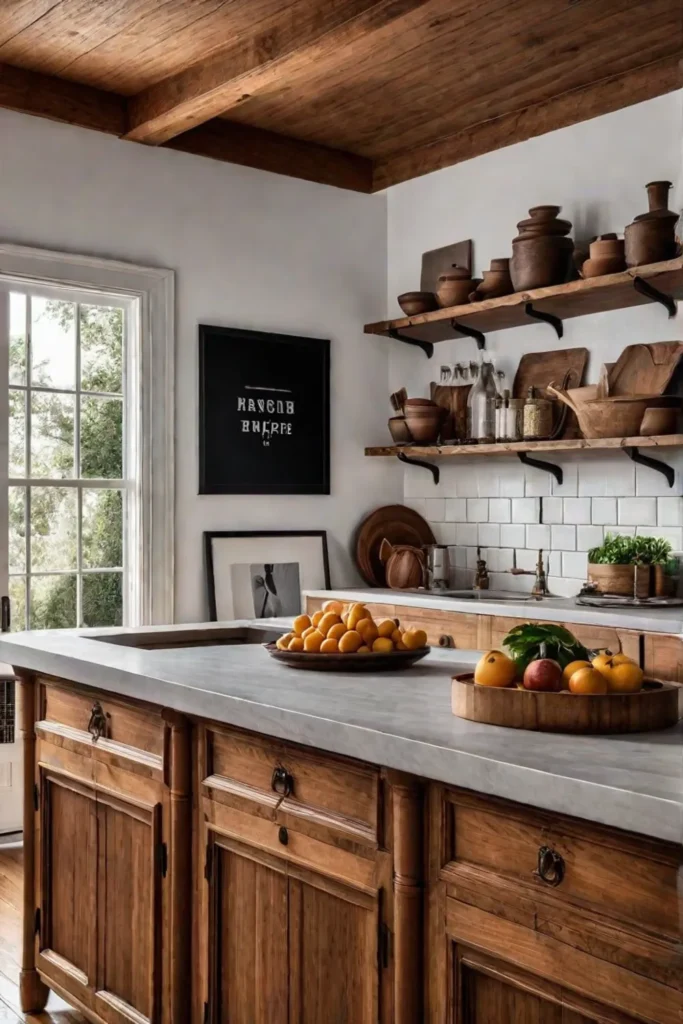
If you do encounter any minor scratches or wear, don’t panic. You can address these issues with simple touch-ups using matching paint or wood filler. Apply these repairs carefully to maintain the desired aesthetic. And don’t forget to check the hardware and hinges periodically, tightening any loose screws and replacing worn components as needed.
Proper maintenance is key to keeping your farmhouse kitchen looking its best. By taking the time to clean, protect, and address any minor issues, you’ll ensure your cabinets continue to enhance your space’s overall charm and character for years to come.
Troubleshooting and Common Challenges
Let’s be honest: Even the most seasoned DIYers can encounter a few hiccups during a farmhouse kitchen remodel. But don’t worry—I’ve got your back with some tried-and-true troubleshooting tips.
One of the most common challenges is ensuring proper cabinet alignment. Misaligned cabinets can throw off the entire look of your kitchen, so pay close attention to leveling and plumbing as you install. If you run into issues, use shims to fill gaps and adjust the cabinets until they’re straight.
Uneven walls or floors can also complicate the installation process. Before you get started, level out any problem areas. Applying a self-leveling compound to the floor or shims behind the cabinets can help overcome these challenges.
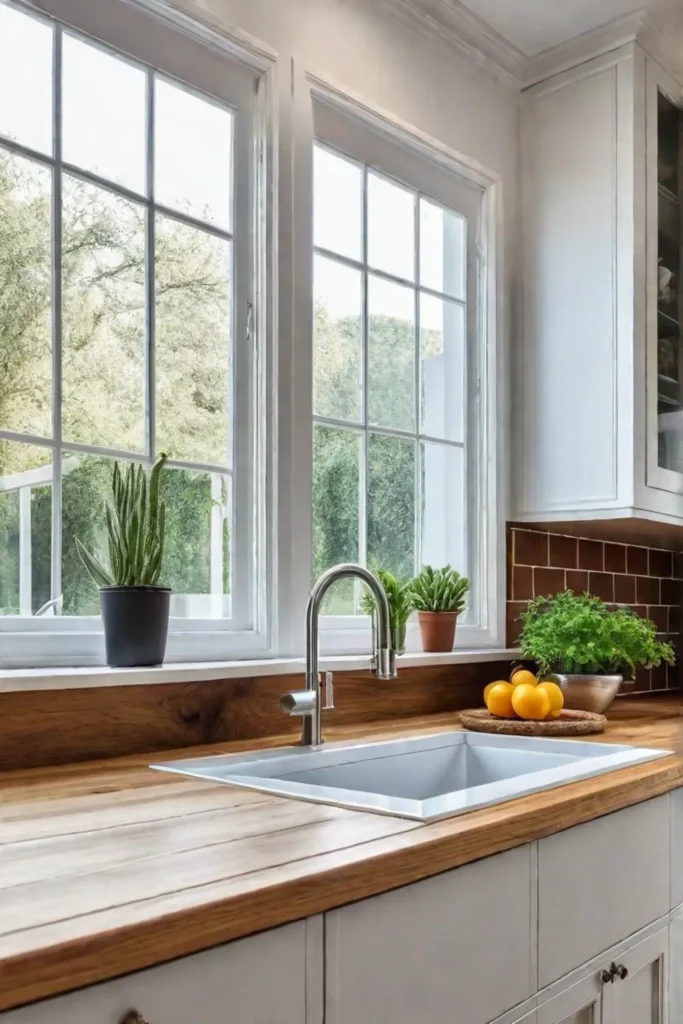
And let’s not forget about unexpected complications. Sometimes, hidden wires or structural damage can throw a wrench in your plans. If you encounter any issues like these, don’t hesitate to consult a professional contractor. Their expertise can help you navigate the problem safely and efficiently.
By staying vigilant and having a troubleshooting plan in place, you’ll be able to tackle any challenges that arise during your farmhouse cabinet installation. Remember, patience and problem-solving can go a long way in achieving the kitchen of your dreams.
Conclusion
There you have it, my friends – a comprehensive, step-by-step guide to transforming your kitchen with farmhouse-style cabinets’ warm, inviting charm. From planning your layout to installing those final decorative touches, I’ve shared all the tips and tricks you need to bring your country-chic vision to life.
The key is to take your time, pay close attention to the details, and embrace the DIY spirit central to the farmhouse aesthetic. With a little elbow grease and my trusty guidance, you’ll be well on your way to a kitchen that feels like it’s been there for generations.
So, what are you waiting for? Grab your tools, gather your farmhouse-inspired materials, and let’s get started on your kitchen makeover. I can’t wait to see the charming, cozy space you create. Happy decorating, my friends!
